#Assassin's Creed Unity Review
Explore tagged Tumblr posts
Text
youtube
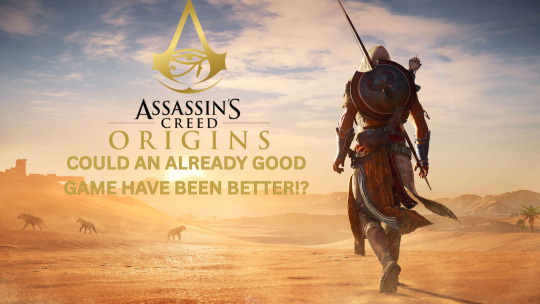
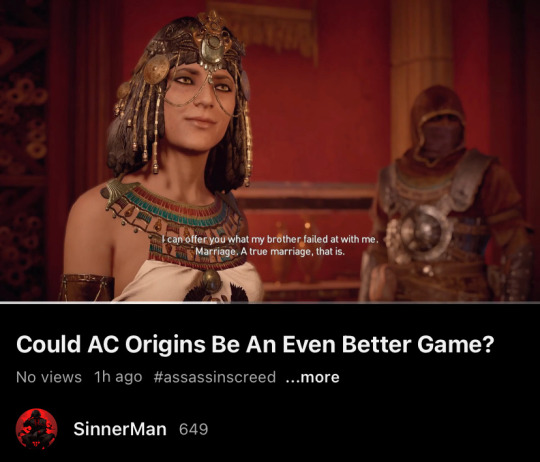
youtube
Honestly I really liked the game, a step in the right direction for the series but just like Ubisoft it was a step that ultimately led back down hill narrative wise.
#youtube#sinnerman#commentary#youtube shorts#game#gaming commentary#gameplay#gaming#video games#games#game review#game trailer#gaming news#viral trends#trending#fypシ#fypage#assassins creed#assassins creed origins#assassins creed bayek#bayek of siwa#ac bayek#ac aya#aya of alexandria#subscribe#assassins creed shadows#assassins creed syndicate#assassins creed unity#ezio assassins creed#creative writing
1 note
·
View note
Text
Here's How Assassin's Creed Changed Open World Gaming MovieAnimeX:-
#MovieAnimeX#movieanimex#review#ac#assassins creed shadows#assassins creed#assassin's creed#assassin's creed 2#assassin's creed 3#assassin's creed unity#assassins musical#assassin's creed shadows#assassin’s creed#assassins creed brotherhood#assassins creed origins#ac 2#ac 3#ac unity#ac black flag#ac syndicate#ac origins#ac valhalla
1 note
·
View note
Text
Just finished grinding Assassin's Creed Mirage! WOOHOO! ୧( ಠ Д ಠ )୨
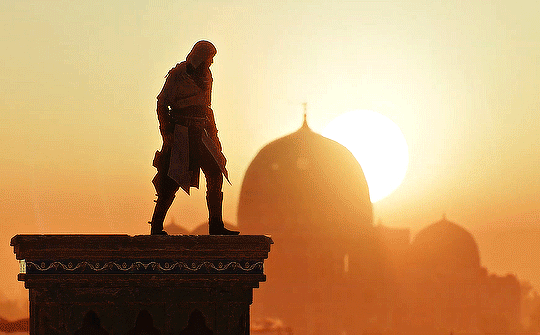
I think it's a deffo wonderful game and a refreshment after the RPG trilogy (it does have RPG elements to it, but still), and it also have some things that are lacking. It reminds me of the good 'ol days, but deffo not on par with the good 'ol days.
Here're some of my thoughts and reviews!
🕌 Sleepy's Assassin's Creed Mirage Review 🗡️
(Spoiler Warning ⚠️ Including the ending ⚠️)
Disclaimer, this is just my personal opinion. You may agree and disagree. I’m just gonna talk a lot because I LOVE Assassin’s Creed with all my heart. Here goes.
VISUALS
(+) Basim Ibn Ishaq, the handsome man that you are… HOLY SHIT (yes I’m adding him as the first plus point of this game what of it). Man's fine AF.
(+) Baghdad’s really beautiful, nuff said. The color palette is PERFECT - displays the warmth of the atmosphere really well, but also just enough greens and many starking hues of flowers.
(+) The waters and environment textures are CRISPY. The detailed patterns on the clothes, the engravings and the state of the arts is really cool. I haven’t really looked a lot into the 800’ Baghdad arts, but I can see lots of good details and art styles. SHOUT OUT TO THE ARTISTS!!
GAMEPLAY - Now here’s what I have a lot to comment on.
(+) Stealth -> I think they did quite good with the stealth. One of the many complaints that I saw on the previous RPG trilogy games was the fact that the main characters/players had no reason to be stealthy, because they can just barge in and defeat the enemies easily. Ubi has marketed the game to be more stealth focused and intentionally made Basim a less of a fighter (make sense, since he came from a thief background, unlike Bayek, Kassandra, and Eivor who are actual trained warriors since they’re kids). However, this brings me to the first lacking point.
(-) Combat -> The combat feels janky. I feel like I’m really fucked up in combat situations if I don’t upgrade my sword and dagger. Like I get it, Basim is not meant to be much of a fighter, but in the beginning parts (or… even the middle parts of the game, let’s be real), I feel like combat is HELL. I forgot the Youtuber who said it, but he said something along the lines of “I’m an assassin, I want to feel like an assassin and want to feel like a badass and can take down many enemies with ease.” And that actually rings true with me. When I’m in combat and countless soldiers are fighting or following me (and I don’t have the smoke bomb with the forgetting effect), I’m most certainly FUCKED.
(+) The fighting style is cool though, it's stylish and the finishing moves are sick af. It could deffo use some work.
(-+) Parkour/Movements - It’s alright. It’s most certainly better than the previous RPG trilogy, but it’s definitely not Unity or Syndicate. Sometimes Basim can do something that I didn’t want and I’ve lost count on how many times I got caught and died just from a mis-movement. I literally don’t understand why they don’t use the Unity parkours and combat styles. Unity’s parkour is smooth, swift, and stylish. It feels GOOD.
(+) Stealing - I’m a loot goblin in games, and believe me, I think I’ve spent like hours just stealing from the entire population of Baghdad that by the end of the game I’m probably richer than the Taxmaster and the whole entire Abbasid Caliphate. It’s fun, it’s easy, but it can sometimes be hard enough to miss. I just hope there’s more variety/difficulty in the stealings in different places – Like maybe in the Round City the diamond thingy is much smaller, or in like for stealing merchants (who has particular fashion/silhouette or have wallets/pouches with different colors) can be harder to steal from but have more rewards and money.
(-+) Map - OKAY. I love the fact that Mirage has a significantly smaller map than that of Odyssey and Valhalla. It’s focused and it’s much more centered. HOWEVER. For a game this caliber, and with this good of a graphic? It’s much too small and it’s too divided between two parts. Hear me out – The graphics are really cool, but I feel like the map is too divided between – either a densely populated city, or just barren lands of desert. I think the map could be much much bigger with much more collectibles and much more variety in the terrains. Like, for example in Black Flag (The S tier game. Argue with a wall), there’re more than one major city, while in Mirage the map is so very centered (Yes I get it it’s the Round City), but I’d love it if there’s another major city that we can travel to, like Damascus, for instace. + I love the Tales of Baghdad. MORE TALES OF BAGHDAD PLEASE.
STORY - nOW THIS… I never liked the stories post - Origins and here's why :
(-) LET 👏 THE ACTORS 👏 DO 👏 MOTION 👏 CAPTURE 👏 - My biggest complaint for the RPG game styles is always about the facial and motion animation. The cutscenes feel DEAD. The eyes are DEAD. I almost can't feel anything. Ubi is rich af, why not use facial capturing? AC3 was the first AC game to use motion capture, and holy shit… it's one of my fave games. Yes. All games, not only AC series. The emotion in their faces, the gestures, the small glances, the little movements - they all decide every character's personality. The reason why I love every AC since AC3-ACOrigins is because the actors pour all their voices, faces, even body movements into the interactions between characters, because they make the stories feel alive. Let the actors be actors. I can rant more but this is already a long post so I'll stop. MOTION 👏 CAPTURE 👏.
(+) I love Basim's origin story. Dude's a 17 year old street thief who got a bit over his head and ended up becoming a fugitive because he killed the fucking caliph himself. That was crazy HAHAHAH anyway even though I think the beginning felt a bit rushed I love it. I just wish they could milk it more.
(+) I love the side characters! Especially Ali (I think he's hot 👉👈 and he's the absolute freedom fighter). Anyway, even though they don’t really do much, they all feel alive and do lots of things (except Roshan prolly HAHAHAH but there's a reason I guess)
(+) Roshan. Mentor and reminds me of Al-Mualim. I particularly love the fact that after all that wise words throughout the game, she literally threatened Basim if he actually went to the underground temple. And when she showed up covered in blood??? And THE TWIST AT THE END??? "Roshan bint La-Ahad". SHE'S ALTAIR'S ANCESTOR. THAT FUCKING SHOCKED ME YOOOO. She's just amazing.
(-) Pacing - I feel like this is because they’re speeding things up (which is a good thing), the pacing is pretty standard in the beginning, but the ending is a bit too high of a rollercoaster mount. The ending went from 0-100 real quick. I feel like we need a more of a climbing storyline. This is why I kind of don’t agree with the ‘centering’ storyline instead of a linear story. Centering styles of story has no climb in the intensity, and because of that we can’t feel the character developments because he’s supposed to stay the same even though we’ve killed like 3 bosses already. And then when all the underlings are dead, finally the boss racks up Basim’s curiosity super duper high that it becomes too sudden.
(-) Weak Villains - The villains since Origins are always hidden and unknown, unlike the previous games where the Templars are literally KNOWN by the people. I want more villains like Haytham tbh, where he literally doesn’t care about the precusor sites and only wants stability in his reign as a Grandmaster. Or if the villains do care about the Pieces of Eden or have a prior interest of the First Civ, at least let them have an actual personality and character, let them be a menace and a threat since the beginning of the game instead of being the NPC’s we kill to finish the game. Let them challenge our beliefs as an Assassin/Hidden Ones. Let the villains actually have an impact to the main storyline. Imagine in the end Basim and Qabiha really went to the underground temple together, and got confronted by Roshan. That’s where the conflict in Basim climaxed! Imagine the emotion! The drama~!
(+) How the stories interlinked with Valhalla. Basim is a sage, and host of Loki who sought revenge to Odin (who wronged him). So I don't think Basim nor Loki are evil per se. They're just gray. Now the stories aren't just about Templars vs Assassin, it's more focused towards the First Civilization. It's a bit hard to keep up but it's nothing a bit of reading/looking up some lore videos wouldn't solve.
MISC
We need more outfits! The outfits are far too few for us to choose from!
Wonderful and mystifying music. Nuff said. Brendan Angelides and Layth Sidiq nailed it. One Republic and Mishaal Tamer’s “Mirage” in on repeat on my Spotify right now.
I love gear chests hunting and all the collectibles. I just wish the map is bigger and there’re more collectibles T_T I’M A LOOT GOBLIN OKAY.
I learn history of Baghdad LFG. I play largely for the stories and not the gameplays, so if there’s a codex entry or any new historical sites I always read it. Learning history doesn’t hurt!
How I can really relate to the real world. I live in Indonesia where 90% of the people is Muslim (I’m a Christian), so when I here familiar words like Alhamdullilah, Assalam’ualaikum and Wa’alaikumsalam, or see the people praying, the Adzan sounds throughout the city, the people praying towards the Ka’bah, it kinda feels like home! Just hope that they add more funny shit to it though, like “Yaallah Basim! Istighfar!” Or “WALLAHI.” Or more Arabic sayings so we can immerse more to the world.
MAKE BASIM DO THE 5 PRAYERS (maybe when we pass time or after a big mission we come back to him finishing a prayer).
FINAL VERDICT - 7.8/10 -> It’s a focused game, and it really did come back to some of the original elements of AC before the RPG trilogy. It’s not too long and casuals can play it without feeling like we have to grind like Odyssey or Valhalla. Deffo would recommend playing it!
Once again, BRING BACK MOTION CAPTURE ‼️‼️‼️🗣️🗣️
If you did play it gimme some thoughts in the comments! Thank you for reading! (人*´∀`)。*゚+
#sleepy's thoughts#non-cod#assassin's creed#assassin's creed mirage#ac mirage#basim ibn ishaq#sleepy's game review#sleepy plays games
102 notes
·
View notes
Note
Hello! I saw your post about Assassin's Creed and wanted to ask more. I was a fan of the series too in its early days for the exact reasons you describe: the meta story, lore, and cultural touches that tended to feel so very real. I fell out after ACIII and after the series emerged from the Unity debacle was told that they'd abandoned (or at least back-seated) those elements.
To hear they've survived in some form is encouraging, but what are your thoughts on the meta story since then? Is it worth giving the series a shot or like you said just an endless trail of breadcrumbs?
So, I think the series started going downhill in AC Origins when they introduced leveling and other RPG mechanics. To me, that was the turning point when the games shifted away from the classic formula in order to chase broader appeal and more aggressive monetization strategies.
Despite this downshift, for me every single title that I've played has had at least some redeeming features that made it worth it.
If you haven't played it, AC IV is actually one of my favorite of the series. That one is well worth a playthrough and I can recommend it without reservation. Fun gameplay, interesting story in both the past and future narratives, and stunning setting.
AC Rogue is also an underrated title that does a lot of interesting things with its story and better fleshes out the dark side of the Assassins and why someone might choose the Templars over them. And if you like the gameplay of IV, it's all the same here (though the setting is mostly frozen northern seas instead of the glorious Caribbean).
AC Syndicate is not as good in general, but does implement some nice features. It's the first (major) title with a playable woman protagonist, and the free running gets a refreshed feeling from updates to the setting. Like, they introduced major traffic in this one (moving trains, carriages and boats on the Thames) and once you get used to it it adds an interesting element to navigating around the setting. Plus your homebase is a train, and I think that's really nifty! And the DLC is pretty good. No really huge plot revelations, but the modern day assassins get better characterized.
AC Origins is another downshift (like I said, they introduce levelling and RPG elements here). I like the main character(s), but honestly, if you're looking for one to skip, I'd probably skip this one. The gameplay is meh and the story doesn't introduce much that is interesting. It's supposed to be about how the Assassins started as an organization, but there aren't really any stunning revelations here. It's more of a personal tale of one man seeking justice for his child. Also, the new modern day protagonist, Layla Hassan, is not very likeable IMO.
AC Odyssey is very similar to Origins, and it's just such a bloated game. It's soooo big. And more action focused. BUT it does introduce a major interesting plot element that I won't spoil here and you also learn a lot more about the Isu. Layla gets even less likeable.
And you've read my review of Valhalla. Layla is still the modern day protagonist, but she's at least getting a little more relatable. I haven't finished it yet, so I can't give my complete impressions. I'm certainly hopeful that I'll learn more about modern day factions within the Templar order and maybe some more about the origins of humanity itself, but that remains to be seen.
8 notes
·
View notes
Text
On the 27th of October, six years ago, Assassin's Creed Origins was released for Windows, PS4 and Xbox One.
Principally set in Egypt, near the end of the Ptolemaic period from 49 to 43 BC, the story follows a Medjay named Bayek of Siwa and his wife Aya as they seek revenge for the murder of their son. It also explores the origins of the Assassin Brotherhood—referred here to as the Hidden Ones—and of their millenia-long conflict with the Order of the Ancients—forerunners to the Templar Order. The framing story, set in the 21st century, follows a new character, Layla Hassan, who relives Bayek and Aya's memories using a modified Animus device.
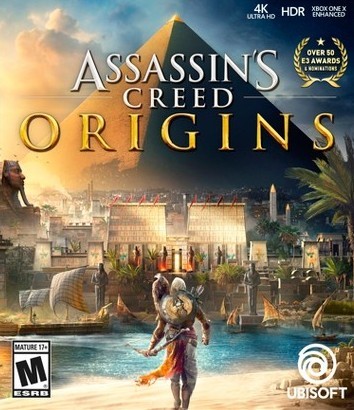
The game's development began following the release of Assassin's Creed IV: Black Flag in 2013. The team consulted Egyptologists and historians extensively to ensure the setting was authentically represented in the game. In response to the common criticism that the gameplay of the series was getting stale and overly familiar, Ubisoft decided to reinvent the Assassin's Creed formula with Origins. Whereas previous entries were mainly stealth-action games, Origins introduces many elements found in role-playing games and an overhauled "hitbox-based" combat system. While Assassin's Creed had been an annual franchise since Assassin's Creed II, an extra year of development time allowed the team to polish the game further. This was largely a response to the tepid sales of Syndicate, and the troubled launch of Assassin's Creed Unity, which was plagued with technical issues when it was released in 2014.
It received positive reviews from critics, with many calling it an improvement over previous entries and praising the story, characters, voice acting, reworked gameplay systems, world design, historical accuracy, and the visuals. However, the game also drew criticism for its pacing, quest design, and technical issues. The game has sold over ten million units worldwide and was nominated for several end-of-year accolades.
12 notes
·
View notes
Text
Blog 3:Intertextuality: Shared Narratives in Gaming Universes
Unity is a defining element of the game narratives, allowing the blending of the different worlds and the stories for creating the deeper, interconnected the experiences. Julia Kristeva’s theory of the intertextuality underlines how the media texts derive the additional meaning through the references to some other works. The phenomenon in gaming is majorly seen in titles such as Kingdom Hearts and the Assassin's Creed Franchise (Jenkins, 2020).
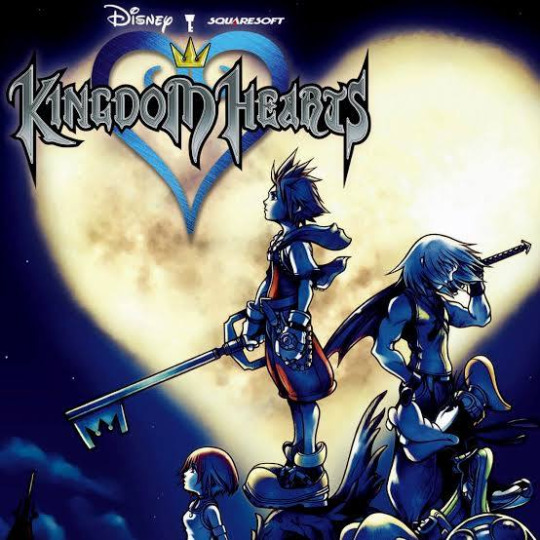
The Kingdom Hearts exemplifies the intertextuality by the blending of characters and the settings from the Disney’s broad catalog by the fantasy worlds of the Square’s Enix’s Final Fantasy series. The players can fight with the Goofy and Donald’s while also exploring some places like Agrabah or Hollow Bastion, all within the overarching the storyline uniquely to the series. A blend of friendly and newly creates an rich tapestry of the narrative layers, the appealing of fans of both the Disney and Final Fantasy, and generating empotional connections rooted in the nostalgia. It bridges these stories together in shared universe around which Kingdom Hearts draws players in through these connections.

But the Assassin’s Creed franchise blends its fictional story with historical events and real-world figures. Assassin’s Creed II will takes place in the Renaissance Italy, as having the player interacts with well-known figures like the Leonardo da Vinci, while uncovering a hidden plot within the Brotherhood of Assassins. The interplay between fiction and history results in an immersive experience with a heavy dose of history, and a good story.
Intertextuality in gaming reflects the ability to combine art forms and fill the cultural gaps. Games like Kingdom Hearts and Assassin’s Creed show how intertextual storytelling can deepen player engagement by connecting all narratives and getting into the emotional power of nostalgia and popularity. This phenomenon also highlights the rise of transmedia storytelling, where interconnected narratives distance between multiple platforms and digital media.
As games continue to evolve, intertextuality will play a more significant role in shaping their narratives and creating experiences that reflect on both personal and cultural levels.
Conclusion
So, this exploration of intertextuality in gaming is rather profitable because of how multilayer storytelling is developed easily. Through the infusion of familiar concepts into new worlds as well as emotional through-lines, games can not only create emotional connections to disparate audiences but also explore previously unexplored connections. Understanding this is a very relevant part of my growing as a creative practitioner as well — because it is a strong reminder to me that nothing comes out of thin air, that everything is built on something else, and that I should take as great inspiration in my own work. From here onwards, I can use this analysis to borrow intertextual elements into my own work by including cultural points or linking disparate narratives with each other for compelling multidimensional stories.
References
Jenkins, H. (2020). Revisiting convergence culture in games: Intertextual storytelling and shared universes. International Journal of Digital Media, 28(3), pp. 204–218.
Robert and RagnarokAngel (2022, April 4). ‘Wow, that Escalated Quickly: Goonhammer Reviews Kingdom Hearts’, Goonhammer. Available at: https://www.goonhammer.com/wow-that-escalated-quickly-goonhammer-reviews-kingdom-hearts/ (Accessed: [1 November 2024]).
0 notes
Text
a review of assassin's creed unity
youtube
This is a long and very opinionated post about my favorite franchise in gaming. Feel free to skip reading it but if you do take the time to read it, maybe you feel the same way as I do about these games. I love Assassin's Creed with all my heart and this creator has other shorts that go with this one but, this is the one I saw that triggered me to write this small essay about Assassin's Creed.
I haven't even touched Unity since they gave it away for free when Notre Dame burned. Unity had me so excited with the crowds and then the release happened and I was just sad. They did Arno really dirty with that story. AC3, Black Flag, and Syndicate have a majority of my hours. I feel like Unity is really just an exploration game more than anything. It does really well for that too; so long as you can stay in the map. Most of the videos I see of Unity now are just exploration based or tactics based. I get the same sadness about Unity's failures as I do Mirage's, because they both had the potential to be extremely great games from release and they just weren't. I think we wanted all of the new and amazing feats Ubisoft managed with this game to work and when it was proven that they weren't able to polish the product nearly enough, we collectively got very disappointed; during a time when games were being pushed out at an alarming rate with little to (in some cases) no polishing or bug fixes. Arno's story is meh. Exploring Paris at one of its most violent eras is crazy to see. The bugs are at times infuriating. I see the ambition with this title the same way I saw it when the devs talked about the size of Black Flag and how vast they had made that game. It really feels like they wanted to create the same epic-ness we got in Black Flag in the form of the French Revolution with their environments and engine capabilities. AC Unity isn't a good game but, over the last near decade it has become something to every player. Whether that something is exploration, funny glitches or even the story is up to each and every player. I roast the ever loving shit out of Unity but if I had to choose between all of the lowest rated Assassin's Creed games I would pick Unity and AC3. Unity had so much potential and you can see that in the early gameplay release trailers where devs showcased the game prior to its release. I see the dream and I see the vision, I also see the failures and shortcomings of this game. I just wanted to talk about this since Unity is popping up on my feeds even more. I have also gotten back into the Assassin's Creed franchise after buying Mirage on sale. This series of games are my all time favorite and were the first "big kid" games I ever played. My fondest gaming memories are me screaming at Ezio to "get the fuck off that pole and swim" and "omg that was so sick I wanna do that again". I love this series even knowing that it will probably disappoint me again and again; but that doesn't mean that the Assassin's Creed experience is ruined for me. Mirage is arguably worse than Unity ever was, that does not mean I don't get any enjoyment out of the game. Unity's state at release disappointed me big time but seeing it shown to me in this way reminds me that a big reason why I started playing these games was to walk around in history like I never could. Mirage is shit and they did Basim so dirty just like they did with Arno; but what I like about Mirage is the setting. I loved the setting of the first game, I loved exploring the Middle East. 9th century Baghdad is beautiful to walk through and see the structures and cultures of a world facing a new era. However that is all AC Mirage has to offer Assassin's Creed players. I didn't feel like I was going on a new adventure with a new assassin, I felt like I was just playing a game because it was there. Which isn't I feeling I enjoy when playing a new game for the first time. Maybe after all this I will finally play AC Unity and perhaps it will give me that feeling of excitement that I used to get when starting a new AC game for the first time. That excitement of an era on the brink of change during a very prominent time in our world's long and storied history. The excitement of seeing the world in a way that is not possible because obvs time travel doesn't exist and some dead disease would kill me. I'll just have to play it and see.
0 notes
Text
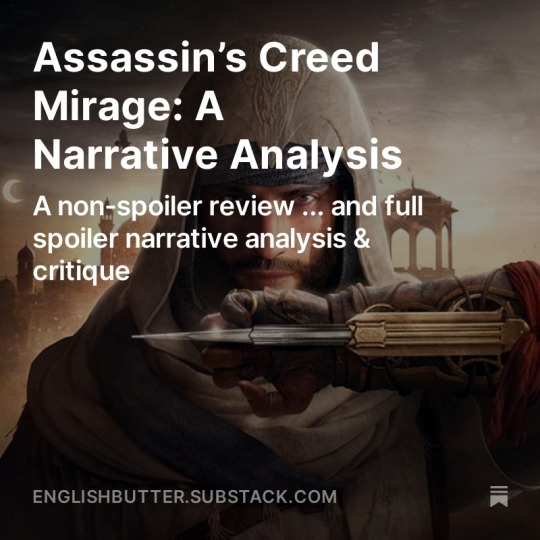
Originally published on Substack, 4th October, 2023. Link!
Since this essay is 10.5k words, I've included the first section below the cut and a link to the Substack article.
A special thanks to Ubisoft ANZ for not only supplying an early copy of Mirage for me to review, but for inviting me to the game’s Sydney launch party this past Thursday. I had a brilliant time and adored meeting the amazing content creators, eating the delicious food, getting pushed outside because of fire alarm shenanigans, and having a ridiculously long 1-on-1 chat with Mirage’s narrative director, Sarah Beaulieu. Thanks for flying halfway across the planet to come and visit us!
INTRO
I have been simultaneously dreading and getting cautiously optimistic for this game for months now, but mostly I’ve been going out of my way not to think about it. My thought process was that when October 2023 came about, I wanted to go into Assassin’s Creed Mirage as neutrally as possible, because my relationship with Assassin’s Creed over the past few years has been turbulent to say the least. The first game I was around for the release of was Origins in 2017, for which I was monstrously hyped. Then when Odyssey was revealed at E3 in 2018, I crashed for I immediately hated it, decrying it along with hundreds of others online. When Valhalla came about in 2020, I simply did not care for it in the slightest. Both for Valhalla by itself, and for Assassin’s Creed as a brand.
I had entered my jaded phase, for I had played two games in a row of a thing I had recently fallen out of love with, and it was a bitter thing to experience. On top of that, I had quietly resigned myself, as had many others in my circle of friends, to never getting back the Assassin’s Creed we liked, and instead we would get more games that built entire countries with 60 hour campaigns. For back then, Assassin’s Creed wasn’t the only franchise Ubisoft was transforming. Post-Origins, their philosophy seemed to be to make everything bigger, better, and endless. A Unity within an Odyssey. I decided to cut my losses and squat on my “section” of the franchise that I liked the most, which are the 18th century games, and thought that would be enough to content me and that I would move on and find new obsessions to take the place that had been occupied by Assassin’s Creed.
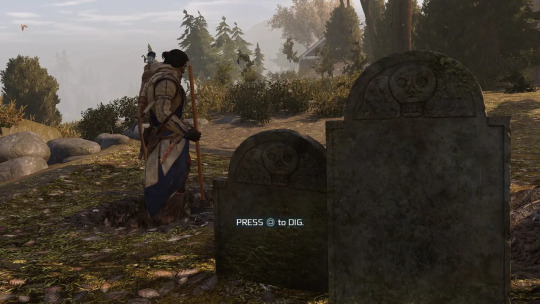
Burying my hopes and dreams for Assassin’s Creed in 2020. (Assassin’s Creed III, 2012 (Ubisoft))
Then mid-2020 happened. Ubisoft’s management were hit by claims of rampant bullying and sexual harassment that stretched all the way to the top of the company. Many high profile people were fired, but for this story, the two big names were Valhalla’s game director Ashraf Ismail, and Ubisoft’s CCO Serge Hascoët. If you weren’t around then, know it was a massive event. With Hascoët in particular gone, there came some hope that these changes would not only turf out abusers and change the general company culture for the better (the results have been mixed to say the least), but be felt in the way Ubisoft made its games. But if their games were going to change, then we’d have to wait for a few years as development pipelines had the chance to catch up.
When Mirage was revealed in September 2022, that cynicism Odyssey and Valhalla had left me with still had me in its grip. I watched the cinematic trailer and kind of felt nothing. Later when I had time to reflect on my emotions it felt both freeing and really fucking terrible. I didn’t care about this thing that had had me in some kind of death grip for six and a half years by then. I could watch this promise of a thing dangled before me and be fine in the thought that I had moved on. But that realisation of detachment felt bad. Because this franchise was the one that got me into video games beyond Nintendo party games in the first place. It was the thing that led me to meet wonderful people and open doors to opportunities like the Mentor’s Guild and Star Player programs, and having my work featured in For Honor not once, but twice.
But I didn’t want to think about that either. I put Mirage to the back of my brain and went on with my life. Mirage would come out eventually, and if it looked good, I’d play it.
And that was my headspace until about a week ago when I went to that launch party. Mirage is here, and boy do I have a lot to say about it.
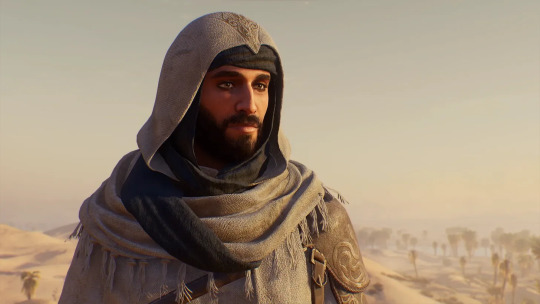
Basim ibn Is’haq, protagonist of Mirage. He has a nice face :) (Assassin’s Creed Mirage, 2023 (Ubisoft))
As a TL;DR review: Mirage is a solid AC game fans have been clamouring for for years. The gameplay loop is fun and engaging and fully committed to delivering the Assassin fantasy. The story likewise is good, but not great. It has memorable characters in Basim and Roshan and does reach some great dramatic moments, even if I found that its beats didn’t land as fully as they wanted. I highly recommend it for fans of Classic Creed. For New Creed fans/players who are looking for adventures like Odyssey, this game might not be for you as it exchanges country-sized maps for a single, dense urban environment (and whilst the map outside of Baghdad is large, it is mostly empty like Origins’ desert regions), has done away with character dialogue choices and romances, banished the focus on magic and mythology, and leans fully into the stealthy Assassin fantasy rather than the build-based branches of Assassin, Warrior, or Ranger you could spec into as Kassandra or Alexios. However, if you’re after some open world action adventure, historical tourism, and/or look to murder a bunch of pixel people, there’s a good chance you’ll have fun :)
This review has been split into two parts — a non-spoiler review that goes over gameplay and my general feelings on the narrative without going into details, and a longer, spoiler filled review that will be less focused on gameplay mechanics and more on narrative. I have marked where the spoiler section starts in bold and with a large page break. Feel free to come back and read my analysis on the spoiler sections once you have finished the game, as I have loads to say about it.
Read the rest on Substack!
0 notes
Text
Assassin's Creed Locations Ranked Part 4
After a bit of a hiatus so I could work on my book and write movie reviews, we're back with part 4 of my list ranking every playable location in the Assassin's Creed series. As a refresher, a playable location is an area you can freely traverse and explore for secrets and missions, so places like Portugal in Rogue and the hidden tombs in II don't count. This entry covers some great historical and mythological locations that didn't quiiiiite make the top ten. We'll cover the top ten next time, so stay tuned to see which of those ten ended up where, and to get incredibly angry at me when your favorite isn't where you wanted it to be. Fun times! Here are the links to the previous three parts. Now, let's get moving. Part 3: https://ryanmeft.tumblr.com/post/731083916756336640/assassins-creed-locations-ranked-part-3
Part 2
Part 1
15
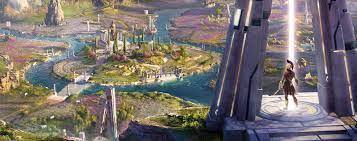
Atlantis (Odyssey: The Fate of Atlantis)
Odyssey’s Fate of Atlantis DLC had three chapters in three different places from Greek myth, but ever since our first tantalizing glimpse in a sidequest, visiting the fabled city itself was the big draw. It didn’t disappoint. Not only was the self-contained story pretty good, but Atlantis was successfully brought back closer to Plato’s description of concentric circles and military culture. There were both towering spires and underground secrets, and intrepid explorers could even carry themselves out from the artificial metro area to the more natural borders of the land. Atlantis promised a lot, and delivered on it.
14

Rome (Brotherhood)
A lot of people were probably kind of puzzled at the fact that, aside from a brief mission at the Vatican, we never visited Rome itself during Assassin’s Creed II. If you happen to also be my particular kind of crazy, you may know that the Renaissance was driven by the other cities in Italy, while any part of Rome not directly under church control had long since degenerated into a disease-ridden backwater virtually irrelevant to world progress. Brotherhood captures exactly that. This Rome is a dim shadow of the capitol of the ancient Empire, consisting almost entirely of wasted ruins of once-great temples, shabby houses, and pushy merchants hawking their wares. It’s not without some remnants of grandeur, but it evokes more sadness for a lost era than anything else. And naturally, the hidden tombs are still the highlights.
13
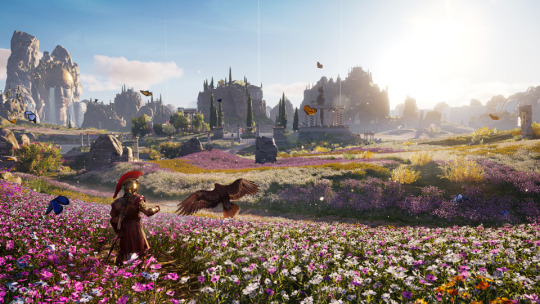
Elysium (Odyssey: The Fate of Atlantis)
The first of three areas you’ll visit in this episodic DLC, Elysium is, like Aaru, an idealized, paradisaical version of ancient Greece, with flowing fields of flowers uninterrupted by man and sparkling, wide rivers circling around the feet of towering clifftop cities where gods and accomplished mortals drink and feast in idyllic surroundings. Ok, I may be exaggerating that last bit, as the game doesn’t render the inhabitants of paradise in any real way---no Piece of Eden-induced apparitions of Hercules or Odysseus will be found here. Elysium so thoroughly evokes heavenly bliss, though, that it’s not hard to let your imagination fill in the blanks. In some ways, it’s even better than the normal Greece of the main game, because it’s contained enough that it never outstays its welcome.
12
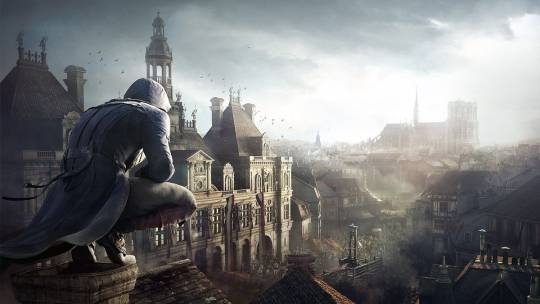
Paris (Unity)
Due to being borderline unplayable at launch, Unity remains a divisive entry in the series, but there’s one thing practically everyone can agree on: revolutionary Paris is jumpin’, man. Moving up a generation, Ubisoft Montreal took full advantage of the extra horsepower to massively increase crowd sizes and behaviors, the scope of the environment, and to render famous landmarks in exquisite detail. Paris is a place where the revered meets the depraved, from the towering spires of Notre Dame to seedy-but-lively cafes to grisly murders in dark alleys, all set to the backdrop of a violent revolution. The great accomplishment of Unity’s Paris is that the city is an ancient place with a life apart from the famous events of the late 18th century.
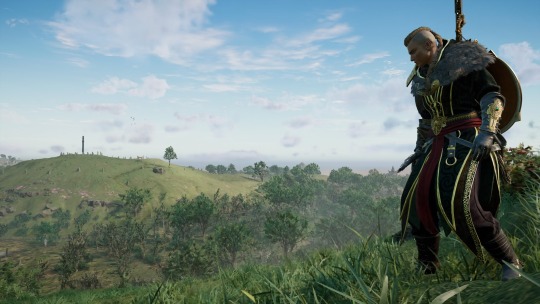
11
Ireland (Valhalla: Wrath of the Druids)
Much like how it is an extreme disappointment to see the fertile history of China’s Warring States Period relegated to a B-list mobile game, it was also a bit of a sting when we realized the only Ireland we were likely to get from the series was this DLC. Still, the Emerald Isle got a better shake than China likely will. Mechanically, there’s no differences in exploration or traversal, but the famously greener pastures, the shadowed, rocky paths that feature in so much Irish folklore, and the renowned passage tombs successfully make it feel like you’re in a new place. The story is even interesting, which is quite frankly more than you can say for most of the open world game DLCs. Still, if we never return to Erin for the more dramatic later periods in its history, it’ll be a shame.
And that's it for this entry! Come back next time to see which games shook out where in the top ten, and remember to please share my blogs if you like them.
1 note
·
View note
Text
Blog 6: Intertextuality and Transmedia - A Study of Assassin's Creed: Unity

Assassin's Creed: Unity was the release that introduced the Assassin's Creed franchise to me and to this day, it stands as the pinnacle of the series, surpassing newer releases with its immersive game mechanics. What is Assassin's Creed: Unity? Broadly speaking, Assassin's Creed: Unity is a 2014 video game developed by Ubisoft, initially met with mixed reviews but later regained popularity due to the Notre Dame cathedral fire in April 2019. Set against the backdrop of the tumultuous French Revolution in 18th-century France, the game combines and mixes fictional characters with real historical events, embodying a concept similar to historical fiction in video games.
Examining the narrative structure of Assassin's Creed: Unity, we find traces of intertextuality and transmedia storytelling. The game strategically uses intertextuality, linking back to the broader "Assassin's Creed" series. With recurring themes like the Animus device, Assassins, and Templars, Unity seamlessly integrates itself into the established lore of the franchise. The Animus, introduced in earlier entries, becomes a pivotal storytelling element, reinforcing the notion that the player's actions in the past do not alter the character's future in modern times. This concept originated from the second Assassin's Creed entry and persists as a storytelling mechanism throughout the series.
Moreover, the reach of the Assassin's Creed franchise extends far beyond video games. It encompasses novels, comics, animated films, and various other forms of media. While Assassin's Creed: Unity may not extensively showcase transmedia content compared to perhaps other game series, the franchise as a whole adopts a noteworthy transmedia approach. Various game instalments explore diverse time periods, characters, and historical events in remarkable detail. For instance, Oliver Bowden's novel, "Assassin's Creed: Unity," offers an additional layer of narrative and historical context to the French Revolution, complementing the immersive firsthand experience provided by the game. Assassin's Creed: Unity emerges not only as a stellar video game but as a piece of storytelling that ingeniously utilizes intertextuality and contributes to the larger transmedia tapestry of the Assassin's Creed franchise. It weaves a captivating narrative, seamlessly blending fiction with historical events, making it a standout instalment in the series.
Sources:
Alfaro, M.J.M. (1996). INTERTEXTUALITY: ORIGINS AND DEVELOPMENT OF THE CONCEPT. Atlantis, [online] 18(1/2), pp.268–285. Available at: https://www.jstor.org/stable/41054827.
Amazon (2014). Unity: Assassin’s Creed Book 7: Amazon.co.uk: Bowden, Oliver: 9781405918848: Books. [online] www.amazon.co.uk. Available at: https://www.amazon.co.uk/Unity-Assassins-Creed-Book-7/dp/1405918845 [Accessed 22 Oct. 2023].
Anon (2019). Notre-Dame: Massive Fire Ravages Paris Cathedral. BBC News. [online] 16 Apr. Available at: https://www.bbc.com/news/world-europe-47941794.
Epic Dope Staff (2020). Is Assassin’s Creed Based on Real Characters and Life Events? [online] Epic Dope. Available at: https://www.epicdope.com/the-reality-behind-assassins-creed-characters-and-beyond/ [Accessed 22 Oct. 2023].
Kotzer, Z. (2014). Meet the Historian behind ‘Assassin’s Creed Unity’. [online] www.vice.com. Available at: https://www.vice.com/en/article/8qxdq5/meet-the-historian-behind-assassins-creed-unity.
Lowry, B. (2017). The Real-world History That Inspired Assassin’s Creed and Its Story. [online] Windows Central. Available at: https://www.windowscentral.com/real-world-history-inspired-assassins-creed.
MelodicVirus (2022). Animus (Object). [online] Giant Bomb. Available at: https://www.giantbomb.com/animus/3055-359/#:~:text=Created%20by%20the%20Assassins%2C%20the%20Animus%202.0%20is [Accessed 22 Oct. 2023].
Otakukart (2022). Assassin’s Creed Unity Ending Explained: How Did Elise Die? - OtakuKart. [online] otakukart.com. Available at: https://otakukart.com/assassins-creed-unity-ending-explained-how-did-elise-die/ [Accessed 22 Oct. 2023].
Rochefort, S. de (2021). Assassin’s Creed Unity Can’t Help Rebuild Notre-Dame, and That’s OK. [online] Polygon. Available at: https://www.polygon.com/features/22790314/assassins-creed-unity-notre-dame-restoration-accuracy.
Veugen, C. (2016). Assassin’s Creed & Transmedia Storytelling. International Journal of Gaming and Computer-Mediated Simulations, 8(2), pp.1–19. doi:https://doi.org/10.4018/ijgcms.2016040101.
0 notes
Text
Others: “AsSaSsIn’S CrEeD SyNdIcAtE hAs BaD cOmBaT, iS tOo CoMiCaL, aNd HaS aNnOyInG pRoTaGoNiStS!”
Me, starting my 4th playthrough of Syndicate: Oh, I’m sorry. I can’t hear you over the sound of how much fun I’m having this this game!
#yes Crowie made the mistake of watching youtube reviews and rankings for AC stuff again#will I ever learn?#probably not lol#I'm so stuck in my little corner of Syndicate and Unity love that always forget how looked down upon Syndicate is by the rest of the fans#(or at least the ones who frequent youtube)#no matter; I still adore this game - flaws and all#Assassin's Creed Syndicate
16 notes
·
View notes
Text
Hey, Citizens! I come bearing news!
My review of AC Unity is coming your way on Tuesday as this is a national holiday in Spain (where I study) so I will have a day off.
Stay tuned and be prepared to tear this game to shreds side by side with me like we tear down any Thermidorian propaganda in this community!
I promise you, this will be fun. ;)
#french revolution#frev#history#frev art#acu#ac unity#assassins creed unity#assassins creed#review update#frev games
16 notes
·
View notes
Text
On the 23rd of October, eight years ago, Assassin's Creed Syndicate was released for PlayStation 4 and Xbox One.

The game's plot follows the premise of the Assassin's Creed franchise, involving a fictional history of real-world events where a secret war has been fought for centuries between two factions: the Assassins, who promote peace and liberty, and the Templars, who desire peace through control. The framing story is set in the 21st century and features the same unnamed and unseen protagonist from Assassin's Creed Unity, who assists the Assassins in their race against the Templars to find an artifact hidden in London. The main story is set in London in 1868, at the onset of the Second Industrial Revolution, and follows twin Assassins Jacob and Evie Frye as they navigate the corridors of organised crime and take back the city from Templar control. The game also includes segments set in 1916, during World War I, which follow Jacob's granddaughter, Lydia Frye.
The game is played from a third-person perspective and its open world is navigated on foot or by carriage. Syndicate introduces new travelling systems to the series, as well as refined combat and stealth mechanics. Players control the two lead characters throughout the main story, switching between them both during and outside of missions.
Assassin's Creed Syndicate received positive reviews upon release, with praise for its visuals, characters, narrative, and level design. However, the combat, open-world design and vehicle gameplay were met with some criticism. The game was nominated for multiple awards, including Best Action/Adventure at The Game Awards 2015. Syndicate was less financially successful than previous entries in the series, selling over 5.5 million units by November 2017. Ubisoft attributed the lower sales numbers to a series fatigue among players, caused in part by Assassin's Creed Unity's disappointing release the year prior, and decided to end the annual release cycle for the series.
#Assassin's Creed#Assassin's Creed Syndicate#Jacob#Evie#Jacob Frye#Evie Frye#Ubisoft#Video Games#Gaming
10 notes
·
View notes
Text
Assassin’s Creed: Unity Review
Did I ever post my Unity review? No? Well here’s my Unity review.
The game is bad.
I think that Assassin’s Creed: Unity is quite frankly the most infuriating game I’ve played in years.
When I’d gotten a PS4 I decided I was going to get one of the AC games that was on PS4 that wasn’t Odyssey (because I already had obtained it and loved it). And I got Unity because I’d heard the free-running was better, and that when played well it was quite good. And while traversing Paris is fun, this game also sometimes plays as garbage and I’m kind of baffled about some of the decisions they’ve made designing it.
You see, this is my experience in playing just about every Assassin’s Creed game: try to be sneaky around the guards, but when that inevitably fails I kill them all. I was starting down this path in Unity when the game stopped me.
“Hang on a sec, you can’t do that,” the game said. “Why not?” I asked. “Because we’ve designed the combat to be utter garbage!” the game joyously exclaimed, laughing maniacally. And it wasn’t lying. The combat is utter garbage and I got killed pretty quickly. The parry is too clumsy for the careful timing it sometimes requires, you’re practically defenseless against guns, and counter kills have been removed. I get the point, of course: the game wants you to try more stealthy approaches, and so if you get detected you’ve got to retreat and rework your approach. But it was just completely at odds with how I played these games. I felt as if the previous games went out of their way to make you feel like a badass warrior and then Unity goes out of its way to make you feel as weak as possible. And for a game that makes you want to avoid combat like the plague, it keeps putting you in it. “But stealth!” the game and its fans reply. Which doesn’t work for me, because the Batman: Arkham games had amazing stealth sections that rely on not getting caught, but the combat isn’t utter crap. If there’s a part of the game you’re hoping people will avoid, maybe you should realize that it’s because that part of the game is terrible and need reworking, not that you’re clever for designing it so. “I actually really liked the combat,” says Unity fanboy #463 on Reddit. Alright, but you do know you are admitting to enjoying something deliberately designed to be unpleasant? It’s a bit like telling everyone you enjoy the smell in gas station restrooms. It isn’t something you should really brag about. Unity fanboy #149 scoffs haughtily. “Well I want my games to be challenging, unlike a casual gamer,” he says. Good for you. But that defense doesn’t work with this game because I’m not just being challenged by the game’s combat difficulty, which is aggravating by design, I’m being challenged by the fact that the game doesn’t work. What makes the stealth and combat so aggravating is how glitchy the game is. At one point in a story-scripted fight Arno wouldn’t attack, block, dodge or shoot, and the only actions he could perform were walking around and dropping smoke bombs. Sometimes Arno refuses to shoot when prompted, as if the targeted enemy was just too cool to die. Sometimes enemies aren’t hurt by being shot. Once Arno refused to start sneaking. I accidentally got into conflicts because I shot guards in the back of the head and instead of dying they turned around and saw me. Every so often, a civilian will walk in front of the barrel of your gun because he or she is suicidal I guess. I bumped into a guard on the other side of a wall. Guards spawned from nowhere to fight me and then when I hid they went back across the street on the other side of a wall. A guard with his back turned saw me on top of a rooftop. Sometimes when you’re detected you have to fight the one guy who saw you, and sometimes you have to fight all of his buddies who also apparently know where you are as they run from all over the block. And on some occasions the guards on the first floor won’t notice if you fire a gun on the second. At some points smoke bombs work to make your enemies lose track of you; at others they won’t. Frequently I’d aim to air assassinate a guard only for the game to switch which guard I was targeting as I’m pressing the button. In short, even if the stealth and combat were fun, the fact is that when you begin either you never know what exactly you’re signing up for because it doesn’t work. And not in a good way, like the game surprising you with extra fun; it’s exactly the wrong sort of way, where you think your mission is to defend an army officer against royalists and because you make too much noise fighting the royalists then the army soldiers decide to kill you too. [Also, you’re encouraged to use smoke bombs a lot. Which doesn’t really sound that stealthy, if you think about it, because a giant cloud of smoking spontaneously erupting around a group of guards is the exact opposite of stealthy.] I’m sure some fanboy will try to assure me it’s my fault that the game doesn’t play well, and that it’s actually pretty well designed. To that, I answer: Cherry Bombs. See, the game gives you this stealth tool called the ‘Cherry Bomb’ which is essentially a firecracker that acts as a noisemaker--you throw it somewhere, it’ll make sparks and noise, and the guards will be distracted and go investigate. This replaces the ‘whistle’ function the past two games had to draw guards over to where you are. What the game doesn’t tell you is that the Cherry Bomb has to be within a guard’s line of sight. Which means if you’re hiding in a hallway and are trying to lure a guard from an adjacent room into the hallway, then the Cherry Bomb won’t work unless the guard can turn around and see it from his position. Otherwise, they may turn around in the direction of the noise, but won’t move towards it. It doesn’t matter if it’s right behind them, or right around the corner; if they can’t see the Cherry Bomb, it won’t work. Essentially, one of the key stealth tools you start out with is a noisemaker that only works if enemies can see it. A noisemaker that works by line of sight! No one can tell me that a competently-designed game would include that! What makes stealth and combat even more difficult is that the game has what it calls “Crowd Events,” which are things that happen in the streets of Paris that you can interfere with, like someone getting robbed, or mugged, or bullied, or whatever. But in crowded areas this happens every minute or so, and even if you don’t interfere in the Crowd Event then the surrounding guards might take notice of someone in the street getting run through, and then a fight will break out and your stealth will be ruined because if you go anywhere near it the guards will detect you and the game will act like it’s your fault for not being sneaky enough. During one stealth mission three or four Crowd Events occurred within seconds of each other, with two spawning at once. They’re optional yes, but call me a moron because I always try to help when someone’s getting gutted on the pavement, which often leads to me being gutted on the pavement. There are times when the game doesn’t tell you what to do in specific situations and then acts like you should have known it all along. In Assassin’s Creed III it gives you specific instructions on what to do in combat when someone points a gun at you. Unity gives you no such help. I didn’t learn until I looked up combat tips for the game that you’re supposed to hit the dodge button at just the right second. Sometimes the game doesn’t give you enough time to realize that someone is shooting at you. If Arno is not in combat mode and someone’s aiming at you, you’re just out of luck, as the dodge button isn’t an option there. There’s an eye that appears next to the minimap, I think to tell you that you’re in a guard’s line of sight, but the game never tells me, so that’s just a guess on my part. The boss fight with Bellec has him disappear with a smoke bomb, and then he will try to jump on you and stab you, which the game doesn’t give any hint as to what you’re supposed to do about and it sucks because if he hits you then you die in one hit. There are skills and abilities that you have to unlock that you really shouldn’t. Double assassination is an ability that takes much too long to unlock; wisely the following game made this unlockable in the tutorial section. Guns have to be unlocked with skill points, which is downright weird; no other game in the series gives that limit, except as being a point of story progression. That you have to spend skill points to use one of the game’s basic weapons is downright offensive. The most infuriating thing is the admittedly rare occasion when the game punishes you for being smart. When you go to assassinate Marie Levesque, for instance, it took me a couple of tries, but I managed to sneak into the palace and take out key guards, noting the escape routes as I went. Only when I actually performed the assassination, all the open windows had been closed and all the guards I took out had respawned. Essentially, I had carefully planned an escape route and the game slammed that door in my face, saying, “Nope! For all our talk of doing it your own way, you have to get out of this situation the way we say you do, okay?” What kind of game punishes you for doing your homework? What is that supposed to teach me?
Customization is cool, in theory, but it’s also a major hassle. Because I just wanted to look cool, but instead I’m constantly juggling a bunch of statistics on how to be stealthy but also carry enough ammunition and supplies. It’s not helpful that if you want to be stealthy, the way the game wants you to play, the outfit most suited to that is the stupidest-looking one of the bunch. I didn’t experience any of the horrifying glitches of people missing faces, the way a lot of people did at the game’s launch. However, NPC bystanders would often walk through cutscenes, including duels and chase scenes, leisurely waltzing right through running characters or in front of enemies as they’re getting shot. There were a couple of scenes where the camera is at an extremely odd angle of someone’s face, with the corner of someone else’s character model in the way. Traversal is far better than previous games; at least, in theory. Most of the time it works, but when it doesn’t, it does so in the most rage-inducing way possible. Often Arno will climb up when you tell him to climb down. It’s not uncommon for Arno to refuse to climb up for no reason at all. If you’re running and you happen to dash past something that would realistically bump him in the shoulder, Arno will start climbing up it and refuse to get down, hopping from table to barrel to chair, including chairs that there are already people sitting in. More than once I was perched on a ledge and then Arno would just fall, arms flailing as he descended into a horde of angry enemies. When sneaking sometimes he just refused to take cover where I tell him to, and will instead just sort of rock back and forth on his heels like a moron or stick to a surface further away from him than the one I told him to take cover behind. “Just wait ‘til you see what we did with Eagle Vision!” the game says, clapping like a madman. I am very tired at this point. “How did you screw up Eagle Vision, that one button that makes it easier to see enemies and detect important elements around you?” I ask. “It’s on a short timer!” Unity is cackling now as it practically explodes with malicious glee. “And it has a cooldown period!” Yes, that staple of the series, Eagle Vision, is now only meant to last a few seconds. Certain types of gear will enable it to last longer and give it more range (WHY WOULD CHANGING YOUR CLOTHES ENHANCE YOUR SIXTH SENSE?!?), but it’s still on a timer, so in order to know where everyone is, you have to keep switching it on. You can see enemies through walls though, which is new and actually good. Optional objectives are back, and aren’t quite as bad as they were in previous games; they don’t have ridiculous conditions in order to get full credit, usually just things like “Do two double assassinations” or “Stun three enemies.” They’re still not great, because again, any idea of freedom is limited in that you won’t get 100% on a mission unless you do it a certain way. The worse is always “Don’t get detected” because this is always followed by throwing you into large spaces filled with half a dozen guards and no cover. You’re better off ignoring them. Hey, did I mention that the game never shuts up? Notifications float up in your face on the right side of the screen, and there is no way to dismiss them; you must wait for them to go away. Black Flag had this too, but those were always small enough that they didn’t get in the way of gameplay, and you could check the past few messages in the pause menu. In this game they’re constantly popping up to tell you tips, location, and useless information, along with a quick sound that pings every time to make sure you stay pissed off. They’ll often pop up on top of each other, so if you’re working on one of the Murder Mysteries and you look at a clue, a notification will pop up on top of the clue information to tell you information you already know and you just have to wait for it to fade away. And when you break a lock in the lockpicking minigame, the popup will helpfully tell you that if you don’t want to break locks, press the button at the correct time. Or, in short, if you don’t want to mess up, then don’t mess up. Thanks, Unity. Speaking of lockpicking, who’s bright idea was it to make it so that of the treasure chests littered across the map, two-thirds of them are locked? I get that in theory it means that there are collectables that you can’t unlock until you’ve progressed, but what it means is that not only do you have to wait to a certain part of the game where you can buy that skill, you have to do an annoying little minigame every time you just want some treasure. It turns the task of collecting into even more of a chore. There are also collectables called “artifacts” which are coats of arms on the walls in random places. They’re not so bad, except in the Helix Rift sections, in which whether or not they show up in their place depends on the alignment of the stars or something. It makes it difficult to even care about trying to collect them all if the game sometimes refuses to let you do so. “So you hated this game?” you, the reader, asks me. That’s the thing though--I wanted very much to like it! There were parts I liked very much, in fact. When the game worked (and I must emphasize it wasn’t often), it was incredibly cool to feel like a stealth Assassin, taking out enemies and disappearing without a trace. This was utilized well in the missions that the game called Black Box missions. Basically, the developers realized that the assassination missions of the past games were too scripted, so they put in situations where you’re given a target and a location and you’re given much more freedom on how to take them out. The Murder Mysteries were, for the most part, excellent and allowed you to use your deduction skillz to put together the clues you’d been given and point out which person was the murderer. They were stressful, but not in a ‘wow-this-sux’ kind of way, more like the rewarding sort of way when you got it right. I liked them a lot. But they were frustrating when popups kept getting in the way of the clues. The Nostradamus Riddles were similarly excellent! They involved solving riddles by finding glyphs all over Paris, given clues that refer to the history of the places. The only criticism I had was that it would have been better if the in-game database had a search engine, sort of like the one in Carmen Sandiego: Treasure of Knowledge to make it easier to find what you’re looking for instead of scrolling through dozens of location entries. But yes, I think I hated it, at least a lot of the time I was playing it. I never thought I’d say that about an Assassin’s Creed game, but I cannot in good conscience tell someone that I liked this game or recommend it to anyone. It was not fun to play. The more time I spent with the game the less I liked it. Often enough I’d have fun, but that would soon be dashed by something stupid like being spotted by a guard through a building or Arno falling off a ledge. This should have been one of the greatest games in the series, and instead it’s undeniably the worst. Do not play this game, do not spend money on this game; every other game in the series is a more rewarding experience than Assassin’s Creed: Unity. Maybe some morbid curiosity is driving you to picking it up, but I urge you: do not listen! I had this whole section planned to talk about the story too! I had a thesis that Assassin’s Creed: Unity is trying to tell the story of France! I was going to talk about character models and history and all! But it doesn’t matter because nothing I say will change the simple fact that this game is not fun to play. Not even in a ‘If you like a challenge’ sort of way. This game is a broken mess that doesn’t work as intended. No. Don’t play it.
6 notes
·
View notes
Text
youtube
#Youtube#gaming#video games#ubisoft#assassin's creed#xbox series x#podcast#game review#assassin's creed unity#assassin's creed parkour
0 notes
Text
Assassin’s Creed Renaissance Review
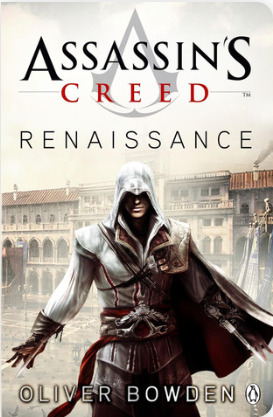
Assassin’s Creed Renaissance by Oliver Bowden is a 515 page Historical Fiction novel. The 1st in a series, where it’s followed by Brotherhood (#2), The Secret Crusade (#3), Revelations (#4), Forsaken (#5), Black Flag (#6), Unity (#7), and Underworld (#8).
'I will seek Vengeance upon those who betrayed my family. I am Ezio Auditore di Firenze. I am an Assassin...' The Year of Our Lord 1476 - the Renaissance: culture and art flourish alongside the bloodiest corruption and violence. Bitter blood-feuds rage between the warring political families of Italy. Following the murder of his father and brothers, Ezio Auditore di Firenze is entrusted with an ancient Codex, the key to a conspiracy that goes back to the centuries-old conflict between the shadowy Templar Knights and the elite Order of Assassins. Ezio must avenge the deaths of his kinsmen and in doing so fulfil his destiny, and live by the laws of the Assassin's Creed. Truth is written in blood.
I rate this book 3/5 stars.
This one is very difficult for me to discuss, because ‘Yes, I did really enjoy this book’, but also ‘I knew everything that was going to happen’. What I hoped for was an Ezio story that I didn’t know, something that happened to him outside of the videogame story that we see told, or a very different take to it. Before I picked it up, it sat on my TBR shelf for over 2021 days! (Yes, excel counted it for me.) And maybe in my mind I subconsciously hyped it up, but this story is exactly the 1st videogame in novel form. If you played that one, don’t pick this one up unless you are a hardcore Assassin’s Creed fan (but then you probably already have it.)
Then there are the issues I have with the writing. There is just a little too much tell rather than show. Like in chapter 14 where Ezio needs to climb a tower within a count of 300. The 1st number we hear is 439, then 5 unknown attempts where the last one is suddenly 293. For me it would’ve been better to show a little improvement over time; 391, 360, 315, 301. Create suspense like “Will he manage to do it now?” Chapter 18 also could’ve been better. I feel like the challenges themselves are overlooked, written with just a few sentences, or they could’ve been more brutally described.
What I do really like is how faithful it is to the games. Like Ezio learns to hide in groups and leaping from one handhold to the next while climbing. But the addition of the Italian language feels like an after thought. Like, oh we’re in Italy and he need to speak Italian, let’s just swap out a few words/sentences, but make sure we put a glossary in the back so all is understood. If you work with another language in the book, I feel that it must be in such a way that through context the meaning of the other language is clear.
Do you have any questions? Or maybe some recommendations? Send me an ask here on Tumblr or tweet me. If you wish to support me, you can buy me a coffee! Or even buy my debut fantasy novel, The Mending Road.
#assassins creed#assassin's creed#renaissance#brotherhood#the secret crusade#revelations#forsaken#black flag#unity#underworld#oliver bowden#historical fiction#book#review#book review#series#serie#books
1 note
·
View note